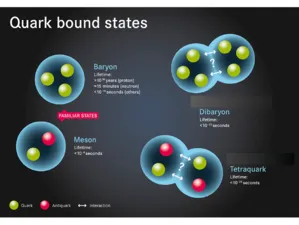Master and Bachelor Theses
Search for New Particles (mesons)
(Experimental physics at the interface of physics phenomenology and computer science)
Context: Quark models and QCD calculations performed on supercomputers make predictions on the spectrum of mesons with „u“ and „d“ quarks.
Much confusion exists on the experimental side on what concerns masses, width and the assignment of quantum numbers of observed states, let alone their interpretation. We have recently found a new meson and also did ground-breaking work on precision measurements of the properties of the pion (press releases for both). This science is directly connected to the understanding of the strong force (QCD) at large distances and low energies and the search for new types of bound states. Using data from the COMPASS experiment at CERN (190 GeV pion/proton beams) our group is performing precision measurement based on highly developed and mathematically involved analysis tools. This science project, which comprises students at various levels and several postdocs/senior scientists, involves the use of several state of the art technologies:
a) Handling of very large data sets (10 Petabyte size)
b) Work on large size computing clusters (200 core E18 and 2000 core LRZ/Excellence cluster)
c) Code optimization using new CPU technologies
d) High performance data fitting with more than 500 parameters
e) Analysis model building
In addition, work is required close to a scientific apparatus:
a) Calibration of particle detectors
b) Adaptation of large simulation codes
Your task: Specific thesis topics can be chosen according to your personal preference and interest
Bachelor students: Enter the world of big science and data analysis. Take up specific aspects in the analysis chain and work on specific items from the list above.
Master students: Perform your own science analysis searching for new particles and determining their properties. The analysis work can start at different levels within the analysis chain, which starts at the selection of a reaction process itself to study the feasibility of a full fletch analysis up to the final fitting process, where spectral information is determined leading to scientific publications.
